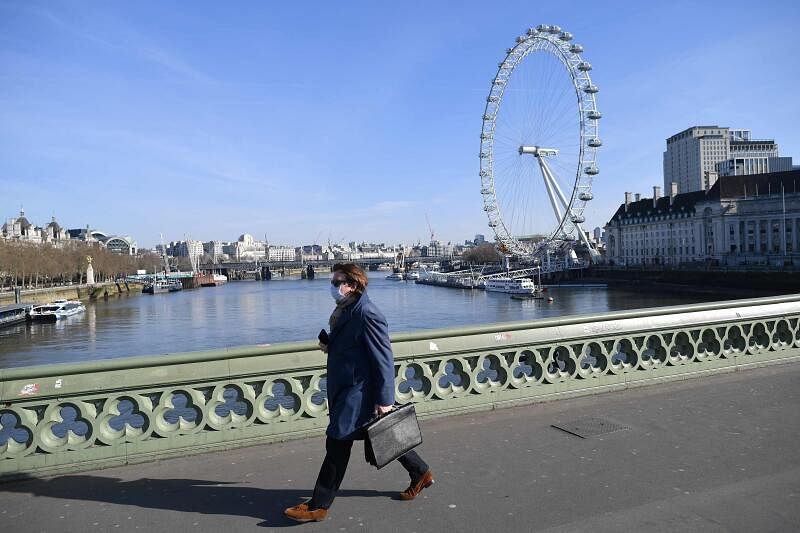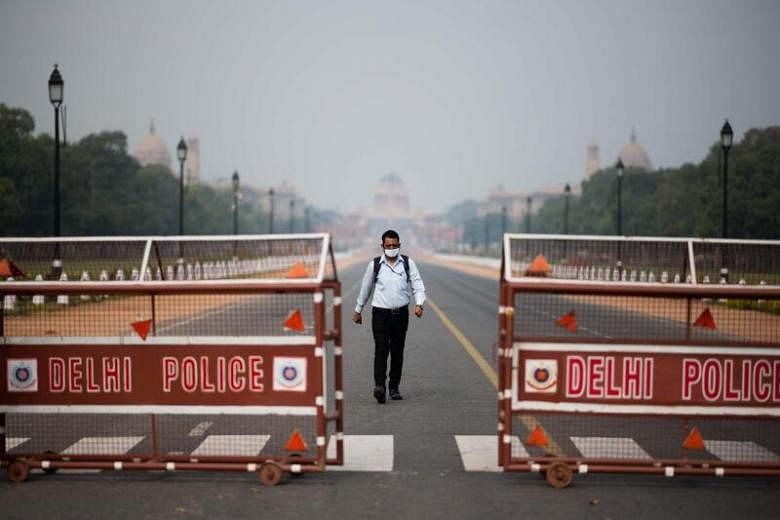SINGAPORE - Countries around the world are beefing up measures to confine people to their homes in a desperate bid to halt the spread of the coronavirus which causes the Covid-19 that has sicked more than 380,000 people in 196 countries and territories.
Here is a look at some of these restrictions:
ITALY (As of March 24 at 9am: 63,927 cases - 7,432 recovered, 6,077 deaths)
Italy has been under a nationwide lockdown, which includes travel restrictions and a ban on public gatherings, since March 10.
Tightening the measures further, Prime Minister Giuseppe Conte on March 21 ordered all non-essential businesses and industries to close until April 3. Residents are also barred from moving across municipalities other than for "non-deferrable and proven business or health reasons or other urgent matters".
The Lombardy region in northern Italy, the epicentre of the country's outbreak, has been under a lockdown since March 8. Under new rules announced late on March 21, sport and physical activity outside, even individually, is banned.
More than 8,200 people in Italy were charged on March 18 for not complying with the lockdown rules, The Local reported. Anyone caught on the streets without a valid reason, such as grocery shopping or going to work, risks a €206 (S$323) fine.
SPAIN (As of March 24 at 9am: 35,136 cases - 3,355 recovered, 2,311 deaths)
The European country of some 46 million people has been in lockdown since March 14. People are only allowed to leave their homes for essential work, food shopping, medical reasons or to walk the dog.
Members of the public who disobey confinement rules could faces fines starting at €100 for minor infractions or up to a year in prison should they "resist or seriously disobey the authorities or officers when they are carrying out their functions", The Local reported.
FRANCE (As of March 24 at 9am: 19,856 cases - 2,200 recovered, 860 deaths)
France is under a 15-day nationwide lockdown that started on March 17. Public gatherings are banned. Most shops, restaurants and entertainment facilities are shut to discourage people from venturing out of their homes.
On the first day of the lockdown, French police handed fines to 4,095 people who breached the order to stay home, France 24 reported. Interior Minister Christophe Castaner told TF1 channel on March 18 the fine was initially €35 but is now €135, and could go up to €375 to dissuade people from going out.
Prime Minister Edouard Philippe said from March 24, the public will only be able to exercise alone or with their children once a day, for no more than an hour, and within a kilometre of their home.
GERMANY (As of March 24 at 9am: 29,056 cases - 453 recovered, 123 deaths)
Stopping short of declaring a lockdown, Germany urges its population to stay indoors and limit contact with other people as much as possible. It has banned gatherings of more than two people, and closed schools, non-essential shops, bars and restaurants.
Despite these measures, people are still socialising outside, calling such gatherings "corona parties".
There are no sweeping, Germany-wide guidelines on fines, leaving it up to the individual states to decide for themselves, Spiegel reported. In the German states of North Rhine-Westphalia and Rhineland-Palatinate, people who unnecessarily leave their homes can face fines of up to €25,000.
Police in Bavaria, Germany's largest state by area, reported only isolated instances of violations on March 21, such as five youths celebrating a birthday party at a construction site and a group of three people drinking around a bonfire, Deutsche Welle reported. Violators were given warnings in each case.
UNITED KINGDOM (As of March 24 at 9am: 6,650 cases - 135 recovered, 335 deaths)

Prime Minister Boris Johnson announced on March 23 that he would place Britain under virtual lockdown with immediate effect, closing all non-essential shops, banning meetings of more than two people and requiring people to stay in their homes, except for trips for food or medicine.
Police will be able to fine people £30 (S$51) if they ignore the rules and these on-the-spot fines will be "ramped up" if there is widespread flouting, the MailOnline reported.
Mr Johnson has made substantial moves in the past week, closing schools as well as pubs, restaurants, gyms, and theatres.
UNITED STATES (As of March 24 at 9am: 43,734 cases - 295 recovered, 553 deaths)
Parts of the United States, such as Washington, San Francisco, California, Connecticut, Delaware, Hawaii, Illinois, Indiana, Kentucky, Louisiana, Massachusetts, Michigan, New York, Oregon, West Virginia and Wisconsin, have issued "stay at home" orders, which means residents should avoid going outside except for essential services - going to buy food or medicine - and if they work in critical sectors, the Business Insider reported. Some local authorities have also imposed curfew, cut down public transportation or closed roads.
On March 16, the White House announced voluntary guidelines - which include avoiding gathering in groups larger than 10, schooling children at home and not eating out - to help reduce the spread of the coronavirus over the next 15 days.
AUSTRALIA (As of March 24 at 9am: 1,887 cases - 118 recovered, 7 deaths)
Australia began living under strict new restrictions on March 23. The new measures designed to minimise the spread of the virus mean many non-essential services, including pubs, clubs, cinemas, gyms and houses of worship, are closed. These measures are expected to be in place for at least six months.
Prime Minister Scott Morrison warned that if Australians fail to adhere to the rules, more draconian measures will be introduced.
MALAYSIA (As of March 24 at 9am: 1,518 cases - 159 recovered, 14 deaths)
Malaysians are living under a 14-day partial lockdown which spans from March 18 to 31. All forms of public gatherings for social, religious, sporting or cultural purposes are banned.
Those who do not abide by the directives under the Restriction of Movement Order (RMO) can be fined not more than RM1,000 or jailed for not more than six months or both, says a Federal Government Gazette.
A mechanic on March 23 became the first person to be charged in Malaysia in connection with the RMO for obstructing a public servant from discharging his duty in enforcing the order. He was fined RM5,000 (S$1,640), in default of 10 months' jail, for the offence.
THE PHILIPPINES (As of March 24 at 9am: 462 cases - 18 recovered, 33 deaths)
Luzon island, which makes up a third of the Philippines and is home to half the country's population of over 100 million, is in lockdown from March 16 to April 13.
Justice Secretary Menardo Guevarra warned that violators who "seriously" resist or disobey enforcers will face charges and arrest. Resistance and disobedience to a person in authority are punishable by a fine not exceeding 100,000 peso (S$2,846) and imprisonment of up to six months.
In Paranaque City, officials punish curfew violators by making them sit under the scorching sun, even though the city's curfew ordinance states that law enforcers should make sure violators are "directed to return to their respective residences, dwelling, or usual place of resting", the Rappler news site reported. Officials in Sta Cruz, Laguna, reportedly cage alleged curfew violators.
INDIA (As of March 24 at 9am: 499 cases - 34 recovered, 10 deaths)
Thirty-two states/union territories in India - nearly the entire country - have imposed complete lockdown, covering 560 districts, according to the Press Information Bureau.
People venturing out without good reason could be arrested, fined up to 1,000 rupee (S$19.03) and jailed for as many as six months, according to The Economic Times.
INDONESIA (As of March 24 at 9am: 579 cases - 30 recovered, 49 deaths)
A two-week state of emergency in Jakarta, which cuts operating hours for transport services such as commuter trains and buses to curb movement, kicks in on March 23. Entertainment centres, including bars, massage parlours, spa centres, cinemas and billiard saloons, are shut.
President Joko Widodo has so far adopted social distancing measures, but has not declared a lockdown of the city whose population of about 10 million increases by several million people during work hours, with many commuting to the capital from satellite towns such as Bogor, Tangerang and Bekasi.
Mr Widodo has instead appealed to firms to allow workers to work from home. There is no penalty for non-compliance.
With input from NYTIMES, REUTERS, BLOOMBERG, AGENCE FRANCE-PRESSE











